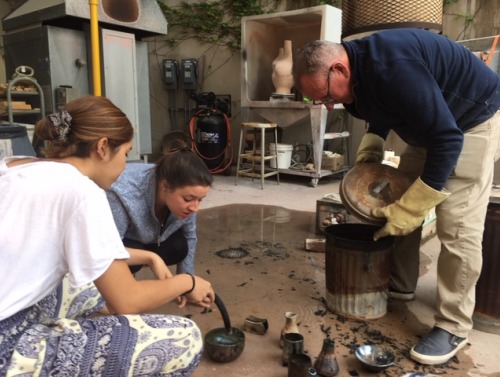Our Academic Facilities
-
Academics
- Academics Overview
-
Undergraduate Studies
- General Education Curriculum
- Concentrations
- Capstone
- Study Abroad
- Special Academic Programs
- Graduate Studies
- Study Abroad
-
Health Professions Advising
- Applying for Medical or Dental School
- Test Prep Support
- Events and Workshops
- Soka Clinical & Advocacy Programs
- Research, Internships, & Volunteering
- Fulbright Student Advising
- Academic Facilities
- Writing Center
- Research
- Academic Services
- Daisaku and Kaneko Ikeda Library
- The Public Health Pathway
Designed with environmental impact in mind, Soka University’s academic facilities encourage the hands-on exploration of topics as diverse as gardening and astronomy to ceramics and language studies.

Soka Instructional Garden (SIG)
The Soka Instructional Garden is used by students to supplement academic courses and programs.

Creative Arts Facilities
Soka offers five types of creative spaces for students enrolled in CARTS courses.

Luis and Linda Nieves Observatory
Opened in 2019, the Nieves Observatory at Soka University of America was generously funded by Luis and Linda Nieves.
Explore Our Academic Facilities
Our scientific research laboratories provide a space for research as well as instruction on various research subjects and areas.
The Soka Instructional Garden supports academic programs through instruction in composting and gardening and serves as a venue to learn and practice these skills in an environmentally friendly, healthy, and safe manner.
The mission of the Soka Instructional Aquaculture Facility is to support the teaching of sustainable aquaculture, the appreciation of aquatic organisms, and aquatic research at SUA.
Professor M. Robert Hamersley’s research interest is in the aquatic cycles of carbon, nitrogen, and other macro-elements as mediated by plants and bacteria. His work spans aquatic environments from wetlands and lakes to estuaries and the open ocean.
Marie and Pierre Curie Hall is a state-of-the-art 91,370 square foot facility that includes five teaching labs, 14 research labs, a lecture hall, and a mix of office and interaction spaces.
The Nieves Observatory provides a hands-on experience for students to observe the cosmos through Soka’s telescope.
The Creative Arts Studios provide spaces for students enrolled in CARTS courses to work on their creative projects throughout the semester. Students using the facilities, which include labs for photography, ceramics, painting, music, and dance, are able to fulfill the learning outcomes of completing creative artwork, developing tools of creativity, and improving general creative processes.
The language lab provides 15 language learning stations equipped with state-of-the-art software and hardware. Students using the facilities at the language lab are able to practice and improve their listening comprehension and speaking skills in the target language.
Explore Soka
Learn about why sustainability is important to Soka, book a tour to visit campus, and discover what topics and hypotheses our faculty are researching and testing.
